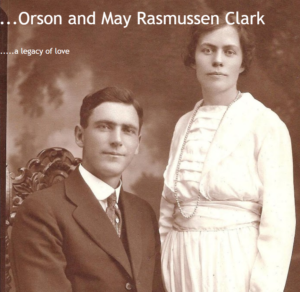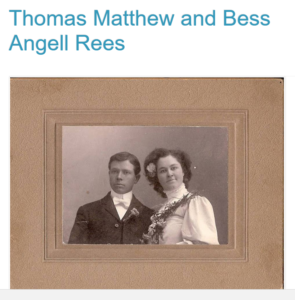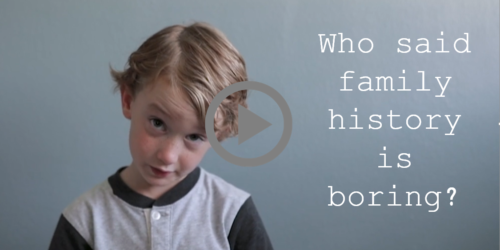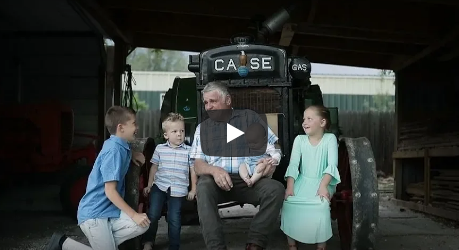How To Create and Reap The Benefits of Family History Blogs
As a creator of seventeen family history blogs (with plans for more), I am obviously and unabashedly a proponent of this simple way to record, track, organize, access and share family history!  Blogging is now easier than ever. With the varied platforms available and an abundance of online help, why not take advantage of this fantastic family history tool to document, preserve, and let others know about what is important to you? You may be surprised at the connections and research success to which blogging can open the door. As you begin, consider these blog options outlined by Family History Daily:
Blogging is now easier than ever. With the varied platforms available and an abundance of online help, why not take advantage of this fantastic family history tool to document, preserve, and let others know about what is important to you? You may be surprised at the connections and research success to which blogging can open the door. As you begin, consider these blog options outlined by Family History Daily:
Private Family History Blog: This means only you can view what you enter. It’s like keeping a journal of your research, but online. It’s a wonderful way to keep track of what you are working on, store photos and documents, create person or surname specific articles, store family photos and stories and so much more.
Semi-Private Blog: This is the best option if you want to share your research and updates with only certain individuals or groups.
Public Family History Blog: What to share your research with the world? Connect with other family historians? Have a one-stop location you can point other researchers to when you want to share what you’ve collected? If the answer is yes, then this is the best option for you.
For those of you who may feel intimidated, find the help you need from Lisa Louise Cooke in a free series of videos on the Genealogy Gems YouTube channel. These videos give instructions for creating a blog with Blogger using a Google account. Another option (along with instructions, benefits and links to get started) is explained by Dick Eastman in this article: Why You Might Want A Personal Genealogy Blog On WordPress.
Dick Eastman in this article: Why You Might Want A Personal Genealogy Blog On WordPress.
Lisa Louise Cooke states that “blogging about family history is a perfect alternative to writing a family history book” and gives these reasons why;
You can write a little bit at a time. You don’t have to fill hundreds of pages or lay out an entire book. With a blog you can write as little as a paragraph at a time. There are no rules because it is your blog! Over time, even a one-paragraph blog post, once a week, will eventually result in many pages.
Every word you write is searchable by Google. Gone are the days of simply posting a query on a genealogy message board that only reaches genealogists. By blogging about your family history, others researching the same family lines can find and connect with you through their Google searches. That opens your query to the entire world,  including the non-genealogist who decides to try their hand at a quick ancestor search. And THAT is why here at Genealogy Gems we call family history blogs “cousin bait!”
including the non-genealogist who decides to try their hand at a quick ancestor search. And THAT is why here at Genealogy Gems we call family history blogs “cousin bait!”
You might bust your toughest brick wall. I’ve heard and shared countless success stories here at Genealogy Gems from readers and listeners. By just “putting it out there” on a blog they have opened the door to a distant relative contacting them with a treasure trove of new information about their family tree.
You’re more likely to spot your mistakes and missing links. Have you ever told a story out loud and discovered in telling it that something in the story didn’t quite jive? A blog can help you tell your family’s story “out loud” too. The process of writing up your family history discoveries can often reveal gaps, errors, or bad assumptions in your research. And that’s a good thing! Use it to your advantage to identify further research that needs to be done. You can even say so in your blog post–no need to throw it away just because there are some missing pieces.
Your kids, grandkids, nieces and nephews are (or will be) online. Your descendants probably prefer to read quick and easy stories on-the-go on their smart phones and tablets, and a blog fits the bill perfectly. Putting your research on a blog provides them with an easy way to digest the family heritage and subscribe to it, since blogs can be delivered to their email inbox or to a blog reader like Feedly. And blog posts are super easy to share to Facebook.
Because there are no excuses. You can start a blog for free. There are no rules, so you can decide how often and how much you write at once. There is just one thing you HAVE to do to successfully blog about your family history: begin.
about your family history: begin.
Because it continues to share even when you aren’t. And that’s the really good news! Even when life gets in the way and you need to take a sabbatical from blogging, your blog is still out there ready to be found. You will still be sharing your family’s story, and attracting relatives to it. And when you’re ready, your blog will be ready for you to add the next chapter.
I hope you are convinced to start your first family history blog, and that the above information is both motivational and helpful. Give family history blogging a try and reap the benefits!
Additional helpful posts from The Family History Guide:
Using Social Media – The New Language Of Family History
The Family History Guide’s Memory Project






Terrific – I really like this approach!
Thank you for sharing all this wonderful info! Family history blogs rock!